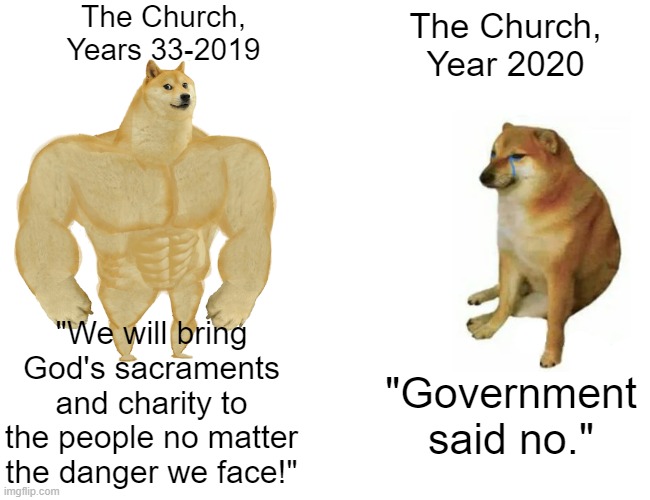One wonders if the organized Church has any shame left. I wondered, thus I read this article. And found pretty much what I expected.
7 things we didn’t see coming in churches at this point after the pandemic
h ttps://www.christianpost.com/voices/7-things-we-didnt-see-coming-in-churches-after-the-pandemic.html
By Thom S. Rainer, Op-ed Contributor
I open with his background.
Thom S. Rainer is the founder and CEO of Church Answers, an online community and resource for church leaders. Prior to founding Church Answers, Rainer served as president and CEO of LifeWay Christian Resources. Before coming to LifeWay, he served at The Southern Baptist Theological Seminary for twelve years where he was the founding dean of the Billy Graham School of Missions and Evangelism.
Which leads me to assume that he’s talking mainly about Baptist churches here.
Admittedly, it’s a tricky thing to find a precise beginning and ending point to a pandemic. We could accept the declaration from the World Health Organization that COVID-19 began on March 11, 2020. But the virus was rapidly spreading around the world prior to that date.
Stop screwing around. The official, public reaction began on the date you gave. But if you want the REAL date that the COVID Plandemic began, it was in January 2017… a few days before Trump was inaugurated, to the bleak horror of Chi-comm-Clinton agents everywhere… that Fauci predicted a ‘surprise outbreak’ would happen during Trump’s term in office in a speech he gave at the Jesuits’ Georgetown University.
Segue
Dr. Fauci Warned In 2017 Of “Surprise Outbreak. During Trump Administration
h ttps://www.huffpost.com/entry/fauci-warned-of-trump-pandemic-2017_n_5e8a0548c5b6e7d76c65c8a4
By Nina Golgowski, 5 August 2020
Dr. Anthony Fauci, the U.S. government’s top infectious disease specialist, warned in early 2017 that a “surprise outbreak” would occur during the Trump administration, and he said that more needed to be done to prepare for a pandemic.
.There is no question that there will be a challenge to the coming administration in the arena of infectious diseases,. he said in a speech titled “Pandemic Preparedness in the Next Administration” at Georgetown University Medical Center. He delivered it just days before Trump was inaugurated on Jan. 20, 2017.
Fauci, who has overseen the National Institute of Allergy and Infectious Diseases (NIAID) since 1984, warned that looming health challenges would involve both chronic diseases . ones already ongoing . as well as .a surprise outbreak..
In hindsight, the Plandemic became official the moment Fauci said that.
.No matter what, history has told us definitively that [outbreaks] will happen,. he said. .It is a perpetual challenge. It is not going to go away. The thing we’re extraordinarily confident about is that we are going to see this in the next few years..
That’s not the sort of thing that experts can be “extraordinarily confident” about. Unless they’re the perpetrators. The easiest way to predict the future is to make it happen yourself.
Fauci ticked off a list of measures needed to prepare for such a crisis, including creating and strengthening global health surveillance systems, as well as public health and health care infrastructure; practicing transparency and honest communication with the public; coordinating and collaborating on both basic and clinical research, and developing universal platform technologies to better facilitate the development of vaccines.
Doesn’t that sound familiar? “Scumbag Cheeto Man Drumpf the Russia Russia Russia Agent Worse Than Hitler will have to face a ‘surprise outbreak’ during his term in office” said the guy who illegally engineered the COVID-19 bioweapon in a Chinese laboratory at American taxpayer expense, which was released for unknown reasons, yet on his schedule, during the year of Trump’s re-election campaign. Which forced America to create the unlawful, public-private biosurveillance state that he had demanded for years.
If you can’t connect THOSE dots then you must still think crayons are for chewing.
End segue
What were we talking about? Oh yes, the state of the Church post-da-‘Rona.
For our purposes, we look at post-pandemic as that time when churches started regathering in person. Some churches started a lot sooner than other churches, but most churches are back to in-person services today.
Left unmentioned, is that that was the first time the Church closed its doors IN ITS ENTIRE HISTORY.

As we look back over this regathering phase, we admit that several developments caught us by surprise. Some are good. Some are not.
1. Digital attendance fell rapidly. We continue to be amazed at the dramatic decline in digital attendance in the churches reporting their data to us. We knew it would not be sustained at the same levels as during the quarantine, but we have certainly been surprised that the drop has been so dramatic.
Why is that surprising? To close the Church is to kill the Church.
Jesus: “Where two are gathered in My Name, there I am also.”
Pastor:

2. Interest in evangelism is increasing. There are two ways to look at this surprise. First, we give thanks to God because more and more churches are responding in obedience to the Great Commission. But we are also aware that the interest is a bit pragmatic as well. Cultural Christians (an oxymoron, for sure) are not returning to church. If a church wants to reach people, evangelism is a necessity.
If Rainer had any spiritual discernment at all, he would 1. know that the Great Commission has already been completed, 2. know the reason why Barbie’s evangelistic trips to Bangcock are ALWAYS a success, and 3. it is evil to categorize men as “Cultural Christians”.
“They aren’t coming back to church after we shooed them away. They must not have been real Christians!”
Skipping #3 for now.
4. The number of full-time church staff has declined more rapidly than expected. Our information is anecdotal at this point…
Three years later?!
…but we believe that the majority of churches have by both necessity and by design reduced full-time personnel. The pace seems to be increasing.
To close the Church is to kill the Church. Also, to be unrepentant about closing the Church. Also, while I fully appreciate the need to occasionally cut deadwood, methinks ‘getting rid of staff by design’ was more about vaxx/mask enforcement. “Jesus is going in a different direction: podcasting from safety.”
5. Church revitalization has become an accepted discipline and practice much faster than expected. The discipline was growing both before and after the pandemic. But the rate of acceptance and growth of the discipline is nothing short of amazing.
“How to reopen the Church after closing it, has become an accepted discipline.” Because it’s never been needed before.
6. Deferred maintenance crises in churches are hindering church adoption. Simply stated, many potential church adoptions have been delayed or dropped because the adopting church cannot afford to upgrade the facilities of the declining church seeking adoption.
“By Church revitalization, we meant re-homing the pastor after his congregation didn’t come back. And he doesn’t want to live in a slum.”
7. Most church search committees still search for pastors like it was 2010. We thought we would see pastor search committees (or similar bodies) more willing to change their processes in light of all of the changes affecting American churches. This intransigent behavior portends poorly for a growing pastor shortage in America.
One wonders at the context of this question. I would never have thought to ask how Covid lockdowns would change the pastor-selection process, because there’s no reason it would. The current process does not serve the needs of Christ or His Church, and was never intended to. It’s intended to gatekeep Church leadership so that a small clique of politically connected, dangerously ignorant and soft-shelled insiders can enjoy respect and authority far in excess of what they deserve, or can even make use of.
The current selection process:
- Reject all applicants who have not graduated from a secular-accredited college.
- Reject all applicants who have ever blamed a wife’s marital problems on the wife.
- Reject all applicants with real-world experience, spiritual giftings and/or disruptive ideas about what a church should be & do.
- For the remaining applicants, host an acoustic-guitar audition.
Changing this process could only open up the halls of power to the meritorious, the devout, and worse of all, the boat-rocking courageous.
Clergy these days, they were HAPPY to close their church in 2020. They never did want to get up on Sunday and preach at the ingrate bench-warmers. Obeying the Jesuit bioterrorists allowed them to, instead, play the guitar for half an hour in front of a webcam whenever they felt like it, and call it “church”. Frauds like that will never allow merit-based competition for their sinecures.
If their church dies off as a result of going webcam-only, well, there’s a simple solution for that… taking the Ticket. Number Three.
3. Church finances held well longer than expected. Billions of dollars of liquidity were injected into the market, which helped individuals and organizations, including churches, for a season. But we are surprised that giving has not declined rapidly with the cessation of government support and the onset of higher inflation.
The Church closed its doors to God’s people, because the false shepherds couldn’t be bothered to care… were too craven to stand during a crisis…
…and when their churches inevitably declined as a direct and predictable consequence…
…the clergy took money from the State so they could close the doors without losing their jobs. They took the Ticket. No hesitation. No remorse.
Let me repeat that for emphasis.
The Church was ABLE to turn against God ONLY because the State provided replacement funding. The theological term for that is “thirty pieces of silver”.
How was the Church changed by the Plandemic? Our false shepherds have been so completely unmasked that even for the bovinely stupid, it now takes more faith to reject God than to accept Him. Which is why they aren’t coming back to church… that’s not where God is.
Faith After the Pandemic: How COVID-19 Changed American Religion
h ttps://www.aei.org/research-products/report/faith-after-the-pandemic-how-covid-19-changed-american-religion/
5 January 2023
Key Points
The COVID-19 pandemic precipitated an overall decline in religious attendance, although religious identity remained mostly stable.
The number of Americans who never attend religious services jumped over the past two years; roughly one in three Americans now report that they never attend religious services.
Young adults report the greatest change in religious attendance of any age group.
Closed churches took covid relief money? Fraud!
And let us consider how we may spur one another on toward love and good deeds, not giving up meeting together, as some are in the habit of doing, but encouraging one another.and all the more as you see the Day approaching. – Heb 10:24-25
Every church who closed failed in its singular purpose to provide encouragement and brotherly camaraderie to the various limbs that form the tree of Christ.
Hagia Sophia coming to a church near you.
https://twitter.com/stillgray/status/1630618828878282752